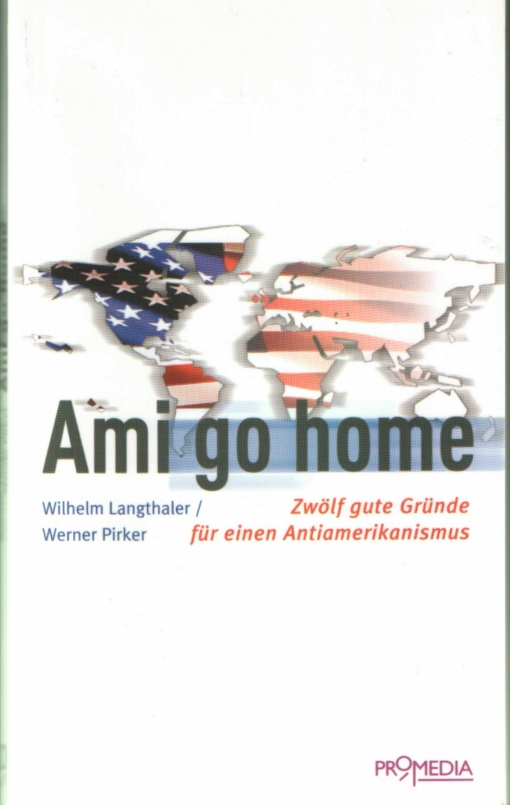Artikel auf Deutsch Questo articolo in italiano There must be something special about a book in German which I can read non stop, without even needing a dictionary. Actually, besides being written in a very clear style, Ami go home: Zwölf gute Gründe für einen Antiamerikanismus ("Twelve Good Reasons for Anti-Americanism") by Wilhelm Langthaler and Werner Pirke (Wien, Promedia, 2003) is an excellent book. In 143 pages, it gives a picture of the American question, that is the main problem of our times.  "Anti-Americanism" does not mean being against America, but being against Americanism. The authors make this clear: "We see Americanism not just as an idea, a myth or an ideology. Rather, it is a system as a whole, which spreads 'shock and awe' throughout the world. Anti-Americanism, as we see it, is not addressed against the American people. Just as anti-Fascism should never mean the condemnation of the German people. One of the reasons which we provide for anti-Americanism is precisely the internal repression against the Americans themselves".It's easy to misunderstand the expression "anti-Americanism", and it obviously makes some problems too for somebody like me, who am twice American - being half from the US and half from Mexico. But the meaning is quite clear. And can be agreed with. Hunting down "anti-Americans", variously accused of hating Marilyn Monroe, free enterprise, democracy and - why not? - humanity too is a fashionable pastime these days. Many believe that any kind of criticism of the American society is a form of envy of the "well deserved success" of a country which shows all its power on the levels we so admire today - richness and military might. Secularizing the Biblical paradigm of poverty as the mark of sin, for example, the Italian writer Claudio Risè has gone so far as to write a book called "Psychopathology of Anti-Americanism", to show that rebelling against the domination is a kind of mental illness. An interesting reminiscence of Cesare Lombroso's studies on the innate sickness which supposedly led so many to become Anarchists in his days. Other people, with opposite political views from those of Risè, still dream of planet-wide working classes eager to seize power from equally universal owner classes. According to this school, any criticism of the US is a kind of petit bourgeois nationalism, or some other comfortable kind of heresy to excommunicate. Others are simply bewildered by the Orwellian language of US propaganda: humanitarian wars, peace missions, exporting democracy and other logical and linguistic monsters do have an effect. Actually, realizing that the US are the most advanced and aggressive form of capitalism of all times is anything but petit bourgeois, psychopathic or intrinsically perverse. It is simply common sense. A short book on such an enormous issue runs many risks: being over emotional or using shaky statistics, for example. Langthaler and Pirke however manage to deal with a large number of elements in a simple but orderly manner. Obviously, a review like this is no substitute for reading the book, so I shall merely list the "twelve reasons" the authors present for opposing Americanism:
|
